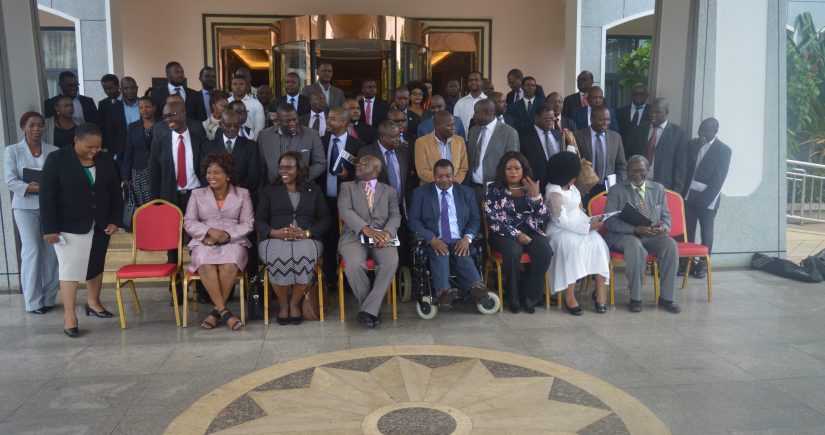In December CoST Malawi launched two key tools to promote infrastructure data disclosure and accountability. The first of these was its new online disclosure platform, which will bring infrastructure information closer to citizens. The second was its fourth Assurance Report, which assesses data disclosure on 33 projects from 10 Procuring Entities across three regions of Malawi. The launch event was attended by the Ministry of Transport and Public Works and representatives from other government bodies, industry and civil society who heard more on the key aspects of these tools.
Malawi’s first Information Platform for Public Infrastructure
Representatives hear the main findings on the CoST Malawi Assurance ReportAdapted from the highly successful CoST Honduras platform, SISOCS, Malawi’s new Information Platform for Public Infrastructure provides important benefits for core CoST stakeholders. It helps Procuring Entities of infrastructure projects to comply with Malawi’s formal disclosure requirement and the CoST Infrastructure Data Standard (IDS) and allows citizens easy access to information on the construction, supervision and maintenance of public infrastructure.
During the launch, Diffrey Matemba, the Internal Audit Manager of the National Roads Authority said, “We are excited that this user-friendly platform which plays a vital role in making information readily available to the public has been launched. Innovations such as this go a long way in ensuring citizens are engaged and empowered to hold policy makers to account. We are very thankful to CoST for supporting it.”
Principal Secretary to the Ministry of Transport and Public Works, Mr Francis Chisinga also expressed the Government’s gratitude to the initiative: “The launch of the IPPI marks another milestone for CoST Malawi. It is now vital for Procuring Entities to take ownership of the platform, ensuring they use it to improve information management and to create confidence among the public.”
Ahead of launching the platform, CoST Malawi carried out training on how to use the system with industry representatives including those from diverse infrastructure sectors including, road construction, water, housing, local development and energy. Using the information taught by CoST experts, these Procuring Entities have now begun to populate the platform and disclose infrastructure data. In addition to building capacity, CoST Malawi will also raise awareness on the platform among the public via a media campaign.
CoST Malawi’s Fourth Assurance Report
The CoST Malawi Fourth Assurance Report highlights a number of key areas of concern across all 33 projects assessed and specifies recurring themes in relation to poor project quality, management and procurement. As to be expected, these areas are often interlinked and have had an impact on project sustainability.
- Poor management is evidenced in the report through delayed payments, delayed project completion, cost overruns and poor filing systems. For example, one project experienced delayed payments and misplaced payment certificates, consequently the project was suspended. Another example is the road between Ekwendeni – Ezonweni, where a lack of poor planning resulted in project design taking place mid-construction.
- Poor procurement processes are evidenced, among other things, by a lack of tender advertising. This can be seen with road development projects where single sourcing, rather than advertising tenders to competing bidders, has been applied.
- In a number of instances budget considerations were prioritised over quality, this is most clearly shown through the construction of roads in Lilongwe which have been built to poor standard as a result of poor workmanship and poor design.
CoST Malawi Recommendations
 CoST Malawi makes a number of recommendations to rectify areas of concern and which can be applied to aide future project delivery. Adhering to these recommendations would ensure that better quality infrastructure is delivered, enabling ordinary citizens to live better lives and increased confidence in the government. Some of its key recommendations include:
CoST Malawi makes a number of recommendations to rectify areas of concern and which can be applied to aide future project delivery. Adhering to these recommendations would ensure that better quality infrastructure is delivered, enabling ordinary citizens to live better lives and increased confidence in the government. Some of its key recommendations include:
For better management
- The need for procuring entities to have a centralised data management system for storing paper files and, in particular, for electronic storage systems to be embraced to avoid problems concerning misplaced documents.
- The Government should also fast track electronic implementation as information is often missing and difficult to track, making it difficult to audit the projects.
For better disclosure
- Although Procuring Entities are aware of CoST, the report asserts that there is a need for further training to enhance knowledge and awareness on the importance of data disclosure. Doing so would also help to accelerate procuring entities data disclosure requirements.
For better procurement
- The Government should apply provisions found in the Procurement Act judiciously in relation to avoiding single sourcing and to avoid such unfair procurement procedures.
